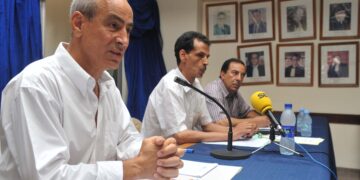Dr. Maor Even-Khen, a judge in the occupation's military courts, approved the detention of Ohio resident Jamal Al-Niser without charge or trial.
(Washington, D.C. April 19, 2023) — The United States should sanction Israeli reserve military judge Dr. Maor Even-Khen for authorizing the wrongful, arbitrary, and political detention of an elderly US citizen, Jamal Afif Suleiman al-Niser, said Democracy for the Arab World Now (DAWN), in a communication to the State Department today.
Even-Khen, a reserve military court judge in the occupied Palestinian territory (OPT), ordered the detention of 76-year-old Jamal Niser, a resident of Ohio, as detailed in DAWN's investigation into the Niser case released April 4, 2023 and an investigation into Even-Khen published [April 19, 2023].
"If the Biden Administration wants to protect Americans from arbitrary imprisonment overseas, it should demonstrate that there are consequences for foreign officials, like Israeli military judge Even-Khen, responsible for those detentions," said Michael Schaeffer Omer-Man, Director of Research for Israel-Palestine at DAWN. "If the administration wants that message to be heard universally, it should apply the same sanctions against officials of any country – especially partners like Israel – where U.S. citizens face arbitrary detention, and not just Russia, Iran and China."
Israeli paratroopers broke down the door to Jamal Afif Suleiman al-Niser's home in a pre-dawn raid on August 24, 2022. The troops did not inform him of the reason for his detention and did not inform his family where they were taking him. Four days later, an Israeli military intelligence officer signed a four-month administrative detention order against Niser. On August 31, 2022, Maj. (Res.) Maor Even-Khen approved the order relying on secret information and without providing Niser an opportunity to defend himself, as detailed in DAWN's report. During the hearing, the Israeli military prosecution revealed the unsubstantiated allegations against Niser in only the vaguest and often contradictory terms, ranging from participation in Palestinian elections to financial misconduct to membership in an illegal organization. The Israeli military proved none of these allegations, and even if true, would comprise political charges.
Months earlier, in response to a previous four-month detention in 2021, the UN Working Group on Arbitrary Detention determined that Niser's imprisonment constituted arbitrary detention, a determination Even-Khen did not address in his ruling.
Niser, born in British Mandate Palestine in 1946, moved to the United States to pursue a college degree in 1967, and raised a family in Ohio where he also owned a number of small businesses and property. Since 1995 he has maintained a second home in the West Bank, where he lives part time. Israeli military officials have at times prevented him from leaving the West Bank, and first detained him based on vague accusations of participation in Palestinian elections in 2021. The Israeli military is currently holding him without charge in Ofer Military Prison in the occupied West Bank on his third administrative detention order, which is set to expire on April 22, 2023 although the military can choose to renew it indefinitely.
Even-Khen, the military court judge, serves as the deputy director of the Economic Crimes Division of the Israeli Justice Ministry in his civilian life. He has overseen the prosecution in several high-profile public corruption cases and wrote two books about financial crimes and corruption. In early 2022 he was passed up for judgeship on the Tel Aviv District Court. Serving as a judge in military courts is considered one pathway to becoming a judge in civilian courts.
"As a trained lawyer and scholar, Even-Khen should know better than to serve as judicial cover in the puppet court of a brutal military occupation that denies its victims the most basic due process and justice itself," Omer-Man added. "That he volunteered to serve as a military court judge makes his culpability in Israel's systemic denial of basic rights and freedoms even more severe."
Under the practice of administrative detention, authorized by Article 285 of Israel Defense Forces Military Order 1651, the Israeli army can imprison Palestinians without charge or trial indefinitely and on the basis of secret evidence, with orders that the regional military commander or an officer authorized by them can renew every six months indefinitely. The regulations for administrative detention say only that the military commander must have "reasonable grounds to believe that a certain person must be held in detention for reasons to do with regional security or public security."
A military court judge must review and authorize the orders, which according to recent data, judges did 99 percent of the time in 2022. The military prosecutor and judge are not required to tell the detainee or their attorney of any specific allegations against them or give them access to any evidence or intelligence reports that they might be able to use to to refute or to launch even the most basic legal defense. In most cases, Israeli authorities use administrative detention as a "preventative" measure which makes defending oneself nearly impossible, though observers have determined and Israeli officials at times admit that the measure is used for punitive and control purposes.
The number of Palestinians in administrative detention reached a 20-year high in 2022 and continues to climb in 2023, passing 1,000 in April. The number of Jewish Israeli citizens held in administrative detention is in the low single digits.
Administrative detention, particularly when used for political reasons as Israel uses it, is a clear violation of Article 9(1) of the International Covenant on Civil and Political Rights, to which Israel is a state party. The convention states that "[n]o one shall be subjected to arbitrary arrest or detention," that "[a]nyone who is arrested shall be informed, at the time of arrest, of the reasons for his arrest and shall be promptly informed of any charges against him," and that "[a]nyone arrested or detained on a criminal charge shall be brought promptly before a judge or other officer authorized by law to exercise judicial power and shall be entitled to trial within a reasonable time or to release." Likewise, the Principles 37 and 38 of the Body of Principles for the Protection of All Persons under Any Form of Detention or Imprisonment provide similar legal safeguards. Israel also abuses the provisions permitting administrative detention in exceptional circumstances under the Geneva Conventions in situations of temporary occupation.
The denial of due process and a fair trial is also a war crime according to the Rome Statute. DAWN is submitting evidence to the International Criminal Court (ICC) of Even-Khen's alleged culpability in the war crime of wilfully depriving a protected person of the rights of fair and regular trial, as outlined in Article 8(1)(vi) of the Rome Statute.
"The Israeli apartheid regime has shown yet again that not even U.S. citizenship or old age can protect Palestinians from abusive practices like arbitrary detention and restrictions on movement," said Sarah Leah Whitson, executive director of DAWN. "We must remember that Jamal Niser is just one of over 1,000 Palestinians Israel is currently imprisoning without charge or trial."
For his role in the arbitrary detention of an American citizen, a violation of international human rights law, the United States should impose sanctions against Even-Khen. Under the authorities granted by Section 212(a)(3)(C) of the Immigration and Nationality Act and Section 7031(c) of the Department of State, Foreign Operations, and Related Programs Appropriations Act, the Secretary of State should impose a travel ban on Even-Khen. The Secretary should also weigh potential financial sanctions under the Global Magnitsky Human Rights Accountability Act and Executive Order 13818.
If the Secretary determines that Niser is being "wrongfully detained," as the UN Working Group on Arbitrary Detention and DAWN have concluded, he should impose parallel sanctions against Even-Khen under the Robert Levinson Hostage Recovery and Hostage-Taking Accountability Act. Utilizing the Levinson Act requires the State Department to determine that the detention of a U.S. citizen is wrongful, which the Biden Administration has done with the high-profile cases of Brittney Griner and Evan Gershkovich. Such a determination unlocks tools for seeking a detained American's release but also provides sanctions for those foreign officials directly and indirectly responsible for the detention.
DAWN's Culprit Gallery
DAWN works to expose the identity of the state agents who enable repression and to make them recognizable at home and abroad. These individuals, whom DAWN identifies as "culprits," bear administrative, civil, moral, legal, or political responsibility for human rights abuses, IHL violations, and international crimes. From other countries in the Middle East and North Africa, DAWN has identified the abuses of individual judges, prosecutors, state security operatives and officers, prison wardens, attorneys general, and diplomats in its Culprit Gallery.
In the Israel-Palestine context, this work exposes not only the identity of the faceless enablers of crimes and abuses, but also aims to expose the many mechanisms and professionals that give abusive and undemocratic systems of oppression a veneer of legality and legitimacy. Untangling the roles of these professional culprits also empowers others to investigate their crimes more thoroughly, exposing them to possible sanctions, international criminal and civil proceedings, and ensure they are not welcome in professional fora in countries and associations that respect democratic values.







































